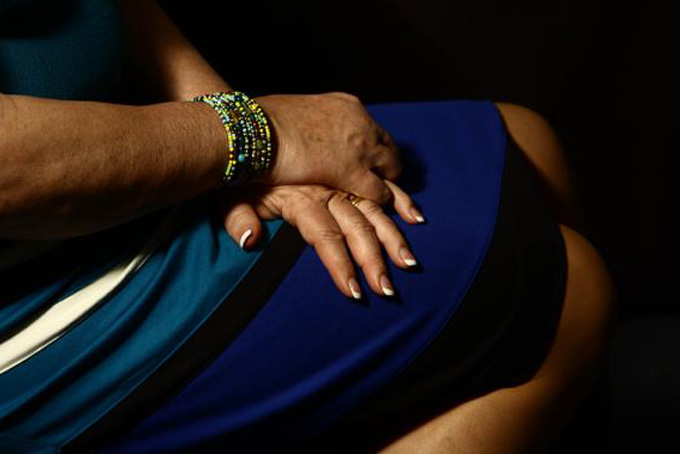
Jane, 59, was born a man but completed her transition from male to female in rural Pennsylvania about two years ago. (Photo by Alexandra Kanik/PublicSource)
Jane’s whole life has been like one long hate crime.
As a teenager, her classmates beat her to a pulp because she shaved her legs. Her family believed that praying would cure what the belt didn’t.
Jane was born a man. Today, she is a woman.
Jane, a transgender woman, asked PublicSource not to use her name because of fear that she might be targeted. She completed her transition from male to female in rural Pennsylvania about two years ago.
“You start to hate yourself,” said Jane, 59, who is tall, with fair skin and a quiet, even voice. The color on her cheekbones matched her rose-colored sweater, with three pearl buttons dotting the collar.
Jane said she was raped in March of this year, targeted because she is transgender. She did not report the rape to police.
“All these incidents are crimes,” Jane said. “And it was all because of who I was.”
The problems Jane describes are often labeled hate crimes — criminal offenses against a person or group because of a bias. But Pennsylvania is one of 15 states that exclude sexual orientation and gender identity in its definition, according to the National Gay and Lesbian Task Force.
In 2008, sexual orientation, gender identity, disability and ancestry were removed from the protection of Pennsylvania’s hate-crime law. Since then, high-profile crimes against specific groups across the state could not be prosecuted under the state’s hate-crime law. If they had been, those convicted could have received more severe sentences.
Currently, the state law protects race, religion, color and national origin. Two bills aimed at adding protections to the hate-crime law have stalled in the state’s House and Senate Judiciary committees.
A federal hate-crime law covers sexual orientation, gender identity and other designations not in the state law. However, federal jurisdiction is generally limited to crimes on federal property or across state lines.
Nearly 260,000 non-fatal hate crimes occurred annually in the U.S. between 2007 and 2011, and an estimated two in three go unreported, according a recent Bureau of Justice Statistics study. The agency’s surveys provide what are considered to be the most accurate numbers, according to Mark Potok, a senior fellow at the Southern Poverty Law Center.
‘A disgrace’
